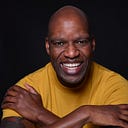When White People Suffer
Can we still call them privileged?
What about me?
That is the question. It’s so integral to human thought and expression that it easily could qualify as our Animal Kingdom equivalent to arf, oink, and moo.
It’s also a question that, whether asked directly or implied, can curtail every meaningful discussion about race and racism. There will almost always be a White person in any room where the elephant that is racism isn’t being ignored who will bring the focus back to themselves. They’ll listen to Black people talking about their experiences dealing with systemic racism in a White world, fold their arms, and basically say (or think): What about me?
What about them?
They seem to want a shining gold star for setting the perfect example of how to be White. They think because they’re “colorblind,” racism and all its attendant menaces (cultural appropriation, White privilege) must be greatly exaggerated, especially since White people struggle, too. The “What about me?” White folks would never admit to being racist, yet when we talk or write about racism, they’re perfectly comfortable making it all about themselves.
Lately, “What about me?”-ism is multiplying exponentially right here on Medium, courtesy of White “writers” who are fed up with White people…

